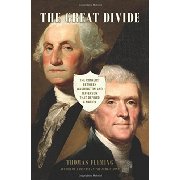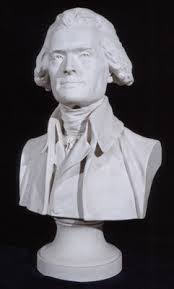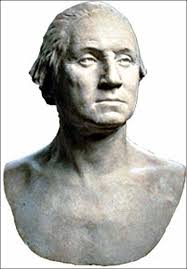
The Great Divide The Conflict Between Washington and Jefferson That Defined A Nation By Thomas Fleming
 The Great Divide
The Great Divide
The Conflict Between Washington and Jefferson That Defined A Nation
By Thomas Fleming
This is an absorbing book that will enlighten many and shock some. Much has been written about Thomas Jefferson’s clash with Alexander Hamilton, but the differences between George Washington and Jefferson have received little attention. The Great Divide rectifies that neglect and more.
James Madison
The more is the shifting allegiance of James Madison. He is called the “Father of the Constitution†because he was instrumental in its drafting. But Madison’s contributions did not start or end there. The Virginia delegate to the Continental Congress was deeply troubled about the dangerous weaknesses of the Articles of Confederation. He visited Mount Vernon frequently to discuss his concerns with Washington. They agreed that the new nation’s survival was in doubt.
 |
 |
Washington warmly endorsed Madison’s call for a national convention, which Madison promoted as a discussion of trade and commerce. But what Madison and Washington hoped to achieve was a drastic overhaul of the federal government. Even so, Madison had to work very hard to persuade the retired general to preside. Having gained Washington’s assent, he used the high regard in which Washington was held to persuade other notables to serve as delegates. Madison and Washington, aided by Alexander Hamilton, convinced some delegates a new government was imperative. Some needed no persuading.
Madison read dozens of books on government and his knowledge contributed greatly to drafting the Constitution. He co-wrote the Federalist Papers with John Jay and Alexander Hamilton, and personally pled the ratification cause in states where approval was in doubt. No one could have been a more knowledgeable or ardent advocate. It is not hyperbole to say that Madison was indispensible to George Washington and to the Founding. All of which makes Madison’s later behavior so difficult to comprehend.
George Washington
George Washington was Jefferson’s antithesis in many ways. He exerted remarkable self-control in adversity and was courageous on the battlefield and off.
What singles out Washington as a leader was the way he dealt with challenges to his army and his reputation almost from the day he took command in 1775. Again and again, he revealed an ability to think for himself and find the right solution to the daunting problems that confronted him. Year after year, he maintained an amazing equanimity in the supply of the constant awareness that failure meant disgrace and death. He was unquestionably a man ready, willing, and able to live dangerously.
He was also an astute politician who, during very tumultuous times, managed to surprise and outwit adversaries.
Washington and Madison
Madison understood that only Washington commanded the respect necessary to shepherd the new government. He prevailed upon a hesitant Washington to become a nominee for president. Not surprisingly, Washington was chosen unanimously by the electoral votes of all the states.
In addition to drafting Washington’s Inaugural Address, Madison advised the new president on his choices for “auxiliary offices.†The term “cabinet†was not yet in use. “As for secretary of state––could there be anyone better than Thomas Jefferson? Madison’s answer was predictably and enthusiastically affirmative. Neither man realized that they were writing finis to their partnership––and eventually their friendship.â€
During the eighteen-month struggle to create and ratify the Constitution, Jefferson was in France to negotiate commercial treaties. In a farewell note to Madison, he reported “the conviction growing strongly that nothing can preserve our confederacy unless the band of Union, their common council [Congress], be strengthened.
These words underscore a significant fact. Thomas Jefferson was out of touch with George Washington and James Madison’s approach to strengthening the federal government. The man from Monticello was thinking about Congress; the man from Mount Vernon and his scholarly young advisor would soon be thinking about a new political entity: the American presidency. This divide in their approach to the nation’s government would grow deeper in the years to come.
When Jefferson received a copy of the Constitution, he wrote Madison about his likes and dislikes. Paramount among the latter was his fear that the first magistrate would succeed himself and become president for life.
Then came the words that t would echo through the rest of Jefferson’s life:
“I own I am not a friend to a very energetic government. It is always oppressive…I think our governments will remain virtuous for many centuries, as long as they remain chiefly agricultural, and this will be as long as there are vacant lands in America. When they get piled upon one another in large cities, as in Europe, they will become as corrupt as Europe.â€
Jefferson’s letters to anti-federalist friends in Virginia and Maryland were far different in tone from the one he wrote Madison. He urged them to “reject this government till it be amended†in a second convention. The final vote in Virginia was 89-79. “A shift of six votes would have condemned the Constitution to oblivion.â€
Thomas Jefferson
While in France, Jefferson experienced a peculiar epiphany. He became a fan of the erupting French Revolution and the ideas that animated it.
What was happening to the American envoy? He was having a conversion experience. With no traditional religious faith to balance his intellect and emotions, politics became Thomas Jefferson’s religion. The cause of liberty, sustained by his belief in the essential goodness of human beings, became his chief article of faith.
Jefferson wrote to Madison suggesting that the central idea might be useful to the new government.
What was this huge idea? The earth belongs to the living. Jefferson declared the principle as self-evident: no man has power or right over his money or property after his death. It “ceases to be his when himself ceases to be, and reverts to the society. Debt contracted by the dead person should also be cancelled.†…Why should they be obliged to repay the debts of the previous generation? They were also under no obligation to obey laws that the previous generation may have passed in a legislature or enshrined in a constitution. “Every constitution…and every law, naturally expires at the end of nineteen years…if it be enforced longer, it is an act of force and not of right.†The only true test of government is to support the will of the majority of the next generation.
Would Madison have had second thoughts had he received Jefferson’s letter before sending Washington’s offer of secretary of state? Madison responded with a gentle but detailed refutation of Jefferson’s “huge idea.â€
Jefferson never replied to Madison’s letter. But he also never abandoned his idea that the earth belongs to the living, and its corollary, the overriding importance of majority rule. From the perspective of 200–plus years, it is obvious that the two men had very different political philosophies.
But, although Madison admired Washington and worked closely with him, their association never reached the level of his friendship with Jefferson. The sickly, diminutive and unprepossessing Madison was the opposite of the tall, handsome, and charming master of Monticello. Jefferson mentored Madison in the Virginia House of Delegates and Madison became his valued advisor when Jefferson was governor. In 1776, the two began what was to become a 40-year correspondence.
It is those letters that Fleming cites above all other sources as instrumental in writing The Great Divide. He credits The Republic of Letters, the Correspondence Between Thomas Jefferson and James Madison (1776 – 1826) as “beyond and in some ways above these estimable volumes. …Nothing can approach the revelations I have acquired from reading and rereading these pages.â€
They reveal that Jefferson was a man whose principles were constantly at war with his character and ambition. He embraced the ideology of the French Revolution with as much fervor as he loathed England. Both obsessions caused him to champion policies that were detached from reality and to engage in activities bordering on treasonous. His perfidy in the “Citizen†Genet affair is one example. Jefferson’s support of the French Revolution included defending the reign of terror and the mass executions.
His personal goals were to become president; to reshape the Constitution to conform to his ideology; and to eclipse George Washington. Jefferson’s great failing was that he was incapable of admitting error. Or he deluded himself as much as he sought to delude others. One of the deluded was his faithful correspondent James Madison.
Jefferson and Madison
The event that opened the rift between Madison and Washington was Hamilton’s Bank of the United States. Jefferson and Madison vehemently opposed the bank as an institution designed to enrich the wealthy. The president saw it as a dynamic commercial force that would help unite the country. But Jefferson envisioned a nation of farmers as the best guardians of liberty. Thanks to them, the nation would demonstrate the perfectibility of human nature. “This utopian faith was at the root of his passionate support of the French Revolution, as well as his determination to keep the supposed corruptions of commerce out of America’s future.”
So began the pair’s undermining of Washington’s presidency. That effort included providing radical newsman Philip Freneau a job in Jefferson’s office. Neither Madison nor Jefferson hesitated to provide Freneau with a government salary so he could found a paper “to attack the administration in which his patron was supposedly a loyal partner.â€
Jefferson’s influence over Madison continued to increase, as did Freneau’s attacks on Hamilton and Washington. Even after supposedly retiring from politics, Jefferson used Madison and James Monroe to discredit Washington. But Washington proved both the better man and the more astute politician.
After Washington
Fleming chronicles Jefferson’s conduct as vice president in President John Adam’s administration and Jefferson and Madison presidencies. Space does not permit more than cursory exploration of these events in a review that is already too long.
President Jefferson
Jefferson’s presidency was a disaster for the nation and almost for his himself. Calling his presidency, “The Revolution of 1800,†he set out to do almost everything differently from Washington. Among other measures, he cancelled all internal taxes and reduced appropriations and salaries for the army and navy. Both would prove disastrous. His reputation and popularity were saved by the Louisiana Purchase. Fleming expounds at length on the circumstances attending the Purchase, an event for which Jefferson took credit he little deserved. It did get him a second term.
Buoyed by his popularity, he overreached. He tried and failed to impeach Justice Samuel Chase on bogus charges and to destroy the Supreme Court. Harlow Giles Unger’s book, John Marshall, reviewed here, also provides an account of these events.
When his flawed foreign policies backfired, Jefferson pushed the Embargo Act through Congress. It forbid American ships to trade with Britain, France, and every other nation. When the economy ground to a halt and a public uproar ensued, Jefferson passed the buck: â€It will rest with the wisdom of Congress to decide on the course best adapted to such a state of things,” he said.
These were the words that President George Washington would never have spoken. He had seen what the wisdom of Congress produced in the American Revolution – disorganization, bankruptcy, and imminent defeat. It was why he and James Madison had created the office of the president – to offset the inability of legislative bodies to govern. Here was the fatal flaw of the ideologue who love to legislate but not to enforce, implement, lead.
When the controversy became too great, Jefferson retreated. “Well before the end of his second term, he virtually withdrew from the duties and responsibilities of high office.†He repealed the Embargo on the last day of his presidency. So ended the Revolution of 1800, but not Jefferson’s efforts to turn the noble principle of equality under the law, enshrined in the Declaration of Independence, into an endorsement of economic leveling and human perfectibility.
President Madison
It was not until the final year of Madison’s presidency that he rejected Jefferson’s advice and the policies that were so detrimental to the nation.
If we include the vigorous leadership President Madison gave Congress in his final year in office and his embrace of the Bank of the United States, internal taxes, and protective tariff, it is no exaggeration to say bad experience, that best of all teachers, forced James Madison to rethink his long devotion to President Thomas Jefferson and reconsider his once angry opposition to President George Washington.
Tellingly, Madison never castigated Jefferson in these reversals. Apparently, he could not find it in his heart to do so.
The Great Divide
Thomas Fleming has written an absorbing and intriguing book. His extensive research reveals much that has been neglected by other historians. In making these revelations, Fleming does not conceal his dislike for Jefferson or his admiration for George Washington. Until recently, historians ignored Washington’s accomplishments as president, often portraying him as a kind of cardboard figure, favored by luck and brilliant associates. Jefferson’s history of Washington’s administration, written after he retired to Monticello, was instrumental in advancing that view.
This reviewer shares Fleming’s admiration of Washington, but has read too much about the public and personal Jefferson to maintain objectivity. The brilliant, inconstant James Madison, to whom we owe so much, remains a puzzle and a reminder that the men we revere as Founders were real people. They were extraordinarily intelligent, gifted, and dedicated, but imperfect as are all human kind. In that spirit, Fleming quotes from Jefferson’s gift of inspiring words and begs readers to “summon forgiveness and rueful––or better, sympathetic ––admiration for this deeply conflicted man.â€
This reader would find that easier to achieve if the pernicious ideology that blinded Jefferson did not still haunt the halls of power.
 The posts are coming!
The posts are coming!
4 comments
I liked this article very much. I learned things about Thomas Jefferson that I had not read before. I will probably order this book later. Thank you! I plan to send it to friends.
[Reply]
We are glad you liked the article. The book is definitely worth reading.
[Reply]
I read The Great Divide a few months ago and was looking for a review to send a friend. By far, this is the best I’ve found. The others have been so superficial as to raise doubts that the reviewer read the book. Or they are reflexive defences of the illusions we have about Jefferson from the many hagiographic biographies that dominate the literature.
Jefferson was first a skeptic of the Constitution and then its enemy. He sowed the seeds of secession in the Kentucky Resolution in 1799, which he published anonymously since a charge of sedition would have been a poor way to launch his 1800 presidential campaign.
Jefferson apologists say we should not judge him by the moral standards of our day. We don’t need to do so in order to have a clear view of the man. Many of his contemporaries, including slaveholders, were as critical of his character as we might be today. While Lincoln was not a contemporary, he was close enough to be able to judge the man in the context of his time, and his judgment of Jefferson was harsh.
Fleming builds a powerful case for a popular reassessment of Jefferson and his legacy. But for me, as a parent, as I think it would be for most parents, it is enough to know that Jefferson fathered a son who he left to grow up in slavery.
[Reply]
I am glad you enjoyed the review. In addition to the book’s historical merits, Mr. Fleming is a fine writer who always keeps a reader’s attention.
He graciously consented to an interview and then a follow-up as well. In case you missed them, I recommend reading what he has to say. Learning his views about the era and the individuals added to my appreciation of the book and respect for the author.
Thank you for commenting.
[Reply]
Leave a Comment